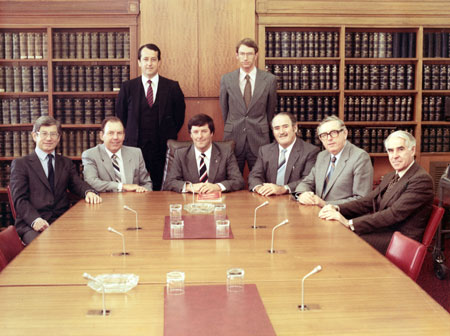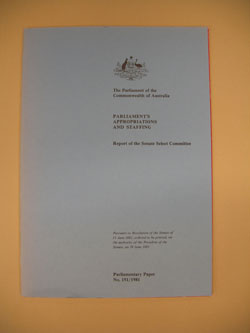Standing Committees
19 Appropriations and Staffing
-
A Standing Committee on Appropriations and Staffing shall be appointed at the commencement of each Parliament.
-
The committee shall inquire into:
-
proposals for the annual estimates and the additional estimates for the Senate;
-
proposals to vary the staff structure of the Senate, and staffing and recruitment policies; and
-
such other matters as are referred to it by the Senate.
-
The committee shall:
-
in relation to the estimates –
-
determine the amounts for inclusion in the parliamentary appropriation bills for the annual and the additional appropriations, and
-
report to the Senate upon its determinations prior to the consideration by the Senate of the relevant parliamentary appropriation bill;
-
in relation to staffing –
-
make recommendations to the President, and
-
report to the Senate on any matter;
-
make an annual report to the Senate on the operations of the Senate’s appropriations and staffing, and related matters; and
-
consider the administration and funding of security measures affecting the Senate and advise the President and the Senate as appropriate.
-
The committee shall consist of the President and 8 other senators: the Leader of the Government in the Senate or a Senate minister nominated to represent the Leader of the Government in the Senate from time to time, and 3 other members of the government party nominated by the Leader of the Government in the Senate, and the Leader of the Opposition in the Senate or a senator nominated to represent the Leader of the Opposition in the Senate from time to time, and 3 other senators not being members of the government party, nominated by the Leader of the Opposition in the Senate or by anyminority groups or independent senators; and in the absence of agreement between the opposition and any minority groups or independent senators as to nominations, any question as to representation shall be determined by the Senate.
-
The committee shall have power to appoint sub-committees consisting of 3 or more of its members, and to refer to any such sub-committee any of the matters which the committee is empowered to consider.
-
The chairman of the committee shall be the President, who may from time to time appoint another member of the committee to be deputy chairman, who shall act as chairman at any time when there is no chairman or the chairman is not present at a meeting of the committee.
-
Where the votes on any question before the committee are equally divided, the chairman, or the deputy chairman when acting as chairman, shall have a casting vote.
-
A senator not a member of the committee may attend and participate in its deliberations, and question witnesses, unless the committee orders otherwise, but shall not vote.
-
The committee and any sub-committee shall have power to send for persons and documents, to move from place to place, and to meet and transact business in public or private session and notwithstanding any prorogation of the Parliament or dissolution of the House of Representatives.
-
A daily Hansard shall be published of public proceedings of the committee.
-
The committee shall be provided with all necessary staff, facilities and resources.
Amendment history
Adopted: 21 November 1989, J.2219, as SO 19 (to take effect on the first sitting day in 1990) (previously established by a resolution of continuing effect on 25 March 1982, J.834–35; incorporated into standing orders as part of the 1989 revision)
Amended:
- 24 August 1994, J.2053 (to take effect 10 October 1994) (committee-specific quorum provision deleted)
- 16 June 2004, J.3480 (terms of reference expanded to include security measures)
- 27 November 2012, J.3418 (terms of reference expanded to empower the committee to meet with a similar committee of the House of Representatives for oversight of information and communication technology services to the Parliament)
Commentary

The Select Committee on Parliament's Appropriations and Staffing ( Source: Government Information Service)
For an account of the origins and operation of the Appropriations and Staffing Committee, see Odgers’ Australian Senate Practice, 12th edition, Chapter 5 (under “Senate’s appropriations and staffing”) and Chapter 16 (under “Appropriations and Staffing Committee”).
The resolution establishing the committee provided for it to be re-appointed at the beginning of each new Parliament, just like any other standing committee. There was no reason, therefore, not to incorporate the resolution into the standing orders when they were rewritten in 1989. No changes were made in the incorporation but the explanatory memorandum tabled with the revised draft on 1 November 1989 notes that it had been intended that the committee be empowered to meet with a similar committee of the House of Representatives to consider matters relating to the joint parliamentary departments.[1] This arrangement had been recommended by the Select Committee on Parliament’s Appropriations and Staffing as a mechanism that would achieve a desirable level of autonomy for the Parliament while recognising the role of the Executive and, at the same time, safe guarding the necessary independence of the Houses.[2] Governments have continued to oppose the establishment of a similar committee in the House.

The Select Committee's report
The committee has high-level membership and includes the President and the Leaders of the Government and Opposition in the Senate, as ex officio members. As with the Procedure Committee, the Leaders are able to nominate other senators to represent them from time to time with the proviso that the Leader of the Government may nominate only another Senate minister, to ensure that the Executive participates in the proceedings. In practice, substitutions of this nature are usually advised in writing to the chair of the committee or the committee secretary.
The composition and chairing arrangements for the committee were untouched by the 1994 restructuring of the legislative and general purpose standing committees and other changes to make committees more responsive to the composition of the Senate. An associated change, however, related to the quorum provisions for committees and subcommittees, which became more flexible. As a consequence, the specific quorum provisions were removed from the standing order, leaving the general quorum provisions in standing order 29 to apply.
The committee’s ongoing interest in parliamentary administration was demonstrated by the most recent amendment to the standing order which expanded the committee’s terms of reference to include an advisory role in relation to the administration and funding of security measures affecting the Senate. This enabled the Senate, through the committee, to continue to have a role in relation to security matters once the function and its related funding had been transferred from the chamber departments to the Department of Parliamentary Services. A related amendment to the Parliamentary Service Act 1999 created a Security Management Board to advise the Presiding Officers. The Board includes the Usher of the Black Rod and Serjeant-at-Arms as members.
The committee’s 54th report recommended amendments to standing order 19 to empower the committee to meet with a similar committee of the House of Representatives for the purpose of providing high-level oversight of the provision of information and communications technology services to the Parliament. This was as a result of an agreement of the Presiding Officers, in November 2011, to undertake a review of the management and delivery of information and communication technology related services and equipment to the Parliament. The report on the review (the Roche Report) was delivered to the Presiding Officers in August 2012.
An outcome of the review was the transfer of the information and communications technology functions and resources of the Senate Department to the Department of Parliamentary Services. The Senate approved the transfer on 16 May 2013 [3], as recommended in the committee’s 55th report.